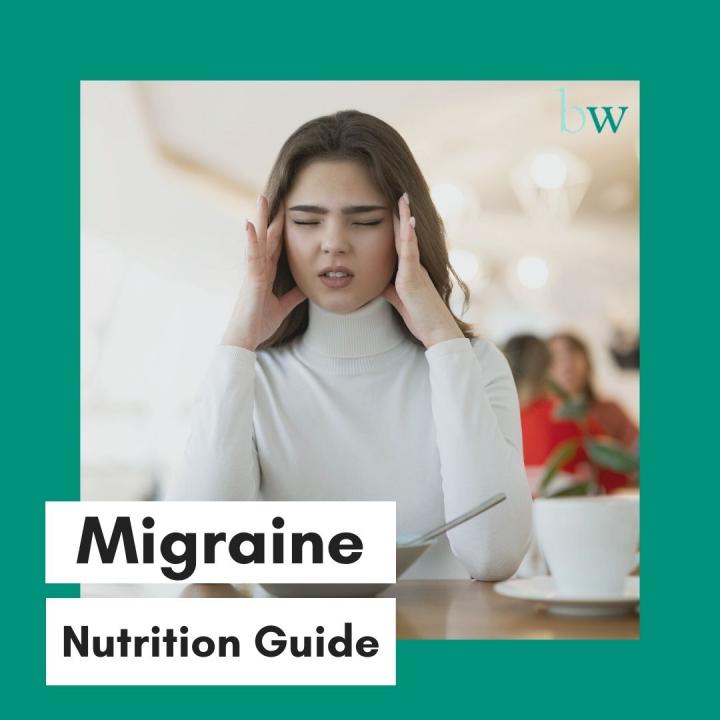Diet and migraine are inextricably linked aren’t they? Most migraine patients have at least one food that it feels like they only have to look at to trigger a migraine.
Often, in reality, the relationship can be more complicated than that – an overstressed system takes the smallest trigger to over react and, by reducing the overall system stress, you may be able to enjoy small quantities of those troublesome foods in the future.
Lisa, our Digestive Health Expert, gives her tips and tricks to managing your migraines with diet.
The big triggers
Serotonin – it’s most often spoken about in relation to anti-depressants. But part of its complex role within the brain is also blood flow regulation – specifically relaxation or constriction of blood flow. So for this reason it is useful to include the foods that trigger serotonin production for migraine.
Histamines – you’ve probably heard about these when people discuss allergies – taking an anti-histamine. But these also trigger food intolerances and, therefore, a migraine.
Magnesium – this helps your body to regulate nerve and muscle function as well as blood sugar levels and blood pressure. As blood flow, muscle inflammation and nerve sensitivity all play a part in migraines you can see why this is a key nutrient for those suffering from migraines.
B Vitamins – these vitamins are really important for nerve health and hormonal health. It’s particularly important for women to make sure that these are included in your diet.
What to do
In the short term it is best to identify and then eliminate the foods that triggering a response in the body.
This means that you can reduce the level of “stress” these foods are causing and reduce your histamine levels – basically giving your body a holiday on the inside!
By doing this you leave room for other interventions to be more effective (medication, physical therapy, sleep pattern, dental and eye health).
Then, in the long term, once some of the other factors in your lifestyle have been addressed you may, with care, reintroduce small amounts of some of these foods.
There are two key ways to identify the troubling foods – elimination diet or an intolerance test.
What to eat
Basically foods rich in serotonin forming tryptophan, magnesium and B Vitamins!
But, as they don’t tend to list those on the side of the packet here is a handy list!
Foods rich in serotonin:
- turkey
- black eyed peas
- walnuts
- almonds
- brown rice
- wholegrains
- sesame seeds
Food rich in magnesium:
- Walnuts
- almonds
- brazil nuts
- pumpkin seeds
- baked potato
- bananas
- basil
- leafy green vegetables
- spinach
- sage
- soya
- tofu
Food rich in B Vitamins:
- Red meat
- Almonds
- broccoli
- milk
- eggs
- Brussels sprouts
- wholegrains
- rice
- spinach
- soya
- yogurt
It is also worth including foods rich in Omega 3. This has positive effects on both brain function and reduces inflammation.
- Sardines
- herring
- salmon
- mackerel
- halibut
- pumpkin seeds
- flaxseeds
- flaxseed oil
- olives
- olive oil
- walnut oil
- soybeans
Supplements
Obviously Magnesium, B Vitamins and Omega 3 are also available as supplements as well and, depending on your personal situation and requirements, you may want to increase your dose in that way.
One supplement that is a powerful addition is Feverfew. It has a strong anti-inflammatory effect, increases the health of blood vessels and reduces the effects of histamines (and therefore their reactions!).
Depending on the symptoms that accompany your migraine, ginger may also help as it can help with nausea and vomiting. It has some limited anti-histamine and anti-inflammatory effect as well. So add it to tea and stir fries for flavour and a boost!
Hydration
Staying well hydrated is a key tactic in reducing many of the triggers that can lead to migraine.
It helps with the blood sugar levels in the brain as well as reducing high blood pressure. Being well hydrated also helps with concentration and fatigue as well. All things that can contribute to a migraine event.
We talk about 1.5 – 2 litres of water a day being a good target. But, in a hot Spanish summer, you may need to increase that significantly, especially if you are active.
The best way to know if you are sufficiently hydrated is to look at your pee – it should be a very light yellow with no scent. If it’s not – drink more water!
What not to eat
Lastly we come to the bit we all try and pretend wasn’t coming – the foods that most commonly trigger histamine production and therefore a migraine.
The most common histamine triggers are:
- Chocolate
- caffeine
- cheese
- beer
- wine especially red wine
- MSG
Avoiding these in the short term while you address some of the other broader issues can help reduce the severity and frequency of your migraines.
You can then review the results of your elimination diet and/or food intolerance testing to see if there are any other big triggers.
This isn’t a forever situation – if you address the other parts of your personal migraine equation then you may be able to reintroduce small amounts of these again!
Help and support
It can seem like a lot when it’s all laid out in a big long list like this! And, it can also seem like not an awful lot is left.
If you’d like help and support on this journey then we can offer food intolerance testing and nutrition guidance and advice.
Not sure which route is best for you? Not sure what’s best for you? Our Patient Care Coordinator can talk you through the options available both at the clinic and locally to make sure you get the best support possible.
If you’d like to book an appointment please contact us directly over email, WhatsApp or in person as required.


